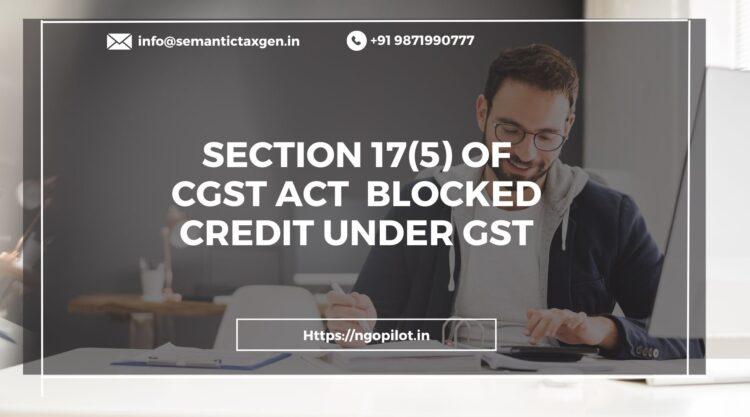
Section 17(5) of CGST Act, also referred to as blocked credits, is a very important provision for every regular taxpayer under GST. It defines a list of purchases on which GST is paid but businesses cannot claim these as the Input Tax Credit (ITC). In this article, we take you through the latest clause-by-clause analysis of Section 17(5) of CGST Act or ineligible ITC with example
Here are the categories of blocked credit under GST for which the input tax credit cannot be claimed:
ITC claims cannot be availed of on GST paid for the purchase of aircraft, ships, and aquatic vessels. ITC can, however, be claimed if the buyer is engaged in any of the following businesses:
ITC cannot be claimed for insurance purchases or repairs when servicing cabs, minibuses, tempos, ships, or aircraft. However, ITC can be availed of if the buyer is engaged in the following businesses:
ITC can’t be claimed on the following:
The exceptions under this clause are as follows:
If you are registered for GST, you can claim a tax credit for the GST you paid on the construction of a building. This could be for commercial or residential buildings and also includes the cost of materials used for fixing or renovating a building, even if it is taken as an asset.
If you are a construction company promoter, builder, or other businessperson, when selling these buildings after construction, you could still claim a tax credit on the expenses you incurred. You could also get a tax credit for buying or building plants and machinery.
Section 10 restricts a specific category of taxpayers; it does not allow them to claim input tax credits on GST paid for purchases. According to this section, certain taxable persons cannot avail themselves of ITC, even when they supply goods or services. For non-residents who are taxable, advance tax deposits are needed. They could get ITC for integrated GST paid on imported goods but are not eligible to claim ITC for any other domestic purchases.
ITC cannot be claimed on goods purchased and used for personal needs. However, if the goods bought are partly used for personal needs and partly for business use, then ITC will be allowed for the goods or services used for business needs.
ITC cannot be claimed when the goods are lost, written off, stolen, damaged, or given away.
ITC cannot be claimed in the following instances:
Section 17(5) of the CGST Act plays a pivotal role in shaping the input tax credit landscape in India. By delineating specific scenarios where credit is blocked, the provision aims to ensure that the GST system operates in alignment with its underlying principles. While these restrictions pose challenges for businesses, they are essential for maintaining the integrity of the tax system and preventing abuse.
As the GST framework evolves, it is imperative for businesses to stay abreast of regulatory changes, adapt their practices, and engage in proactive compliance measures to navigate the complexities associated with blocked credit under Section 17(5).
DISCLAIMER: The information provided in this article is intended for general informational purposes only and is based on the latest guidelines and regulations. While we strive to ensure the accuracy and completeness of the information, it may not reflect the most current legal or regulatory changes. Taxpayers are advised to consult with a qualified tax professional or you may contact to our tax advisor team through call +91-9871990777 or info@semantictaxgen.in
© 2013-25 Semantic Taxgen Pvt Ltd - All Rights Reserved